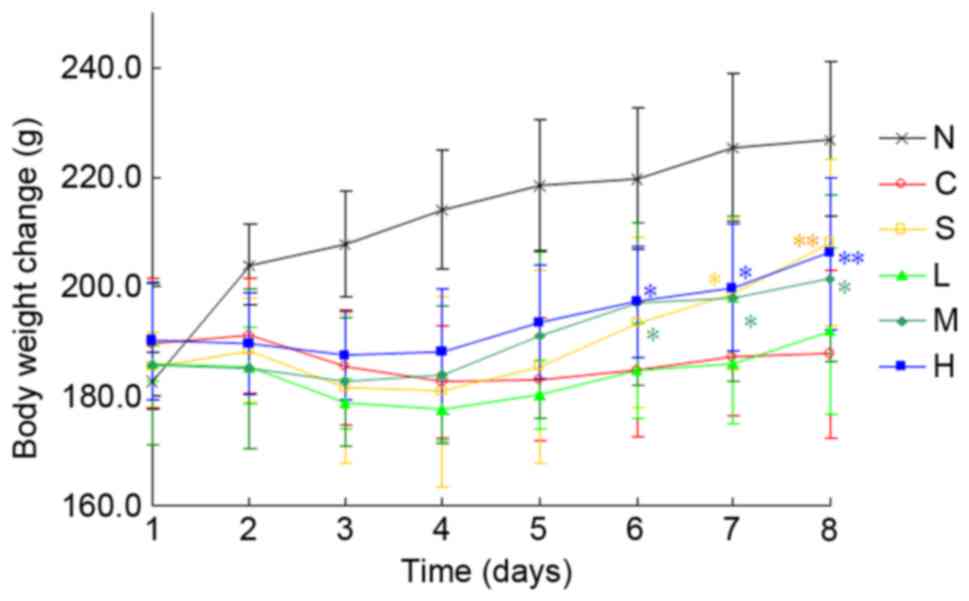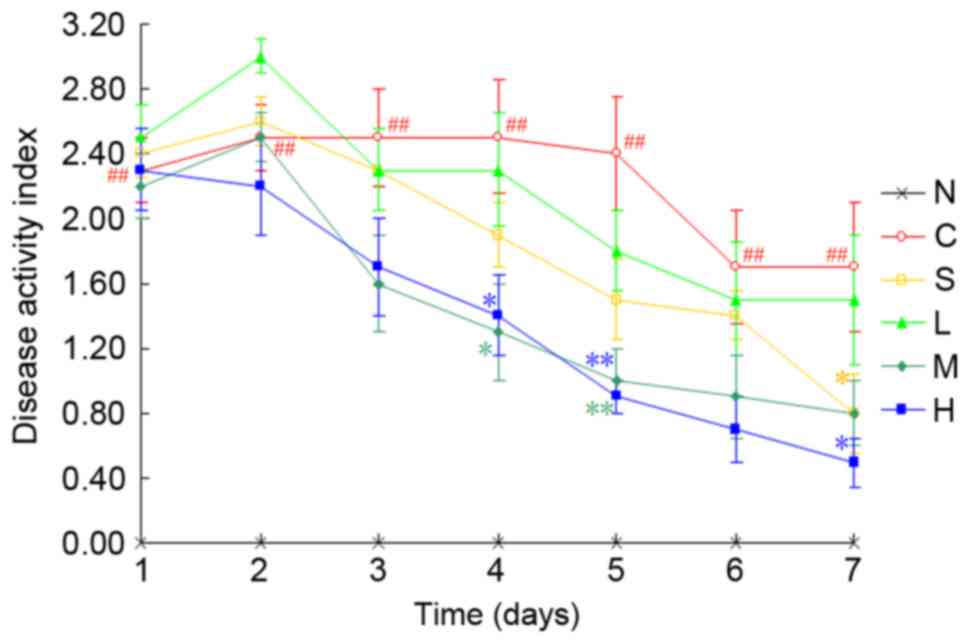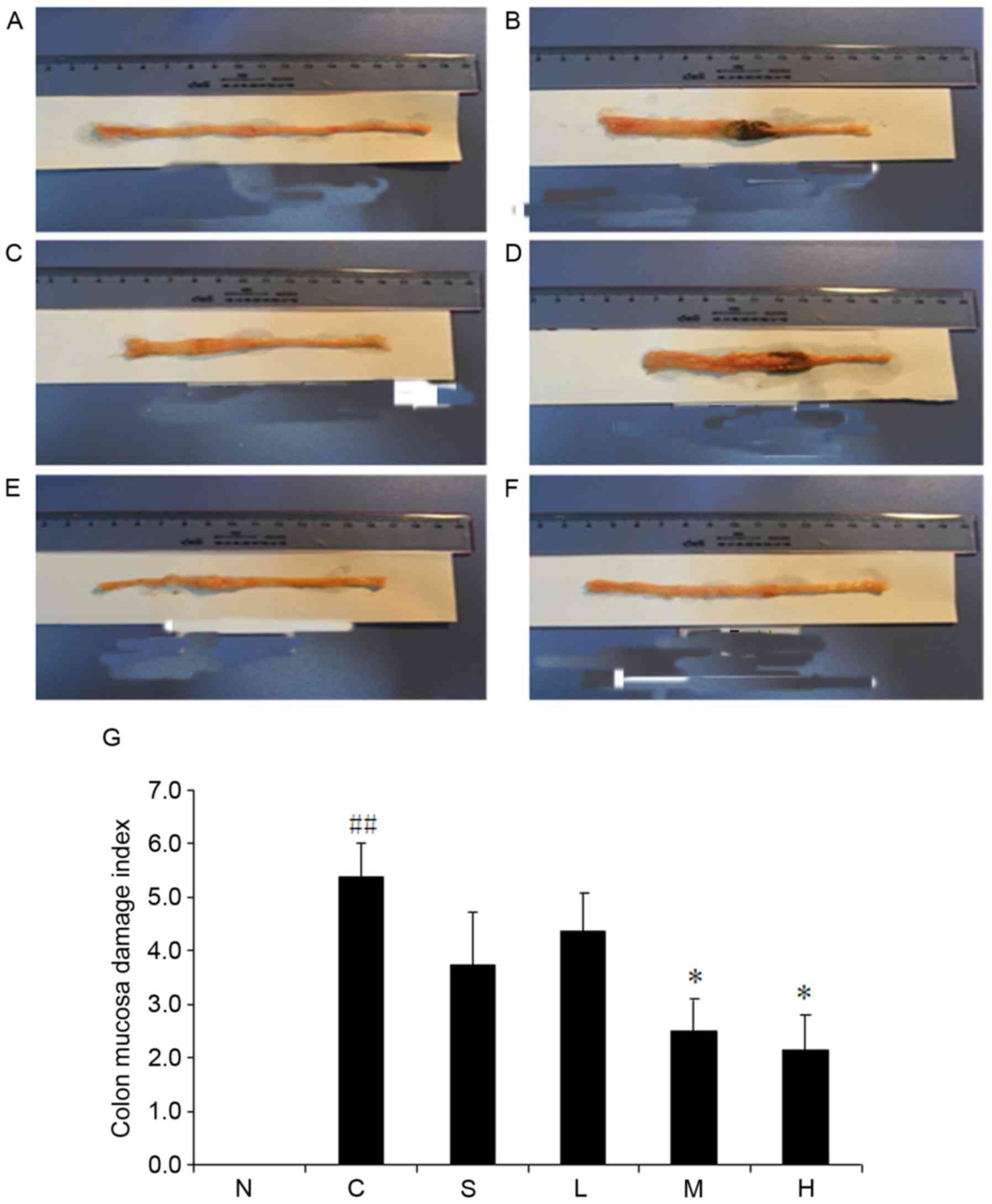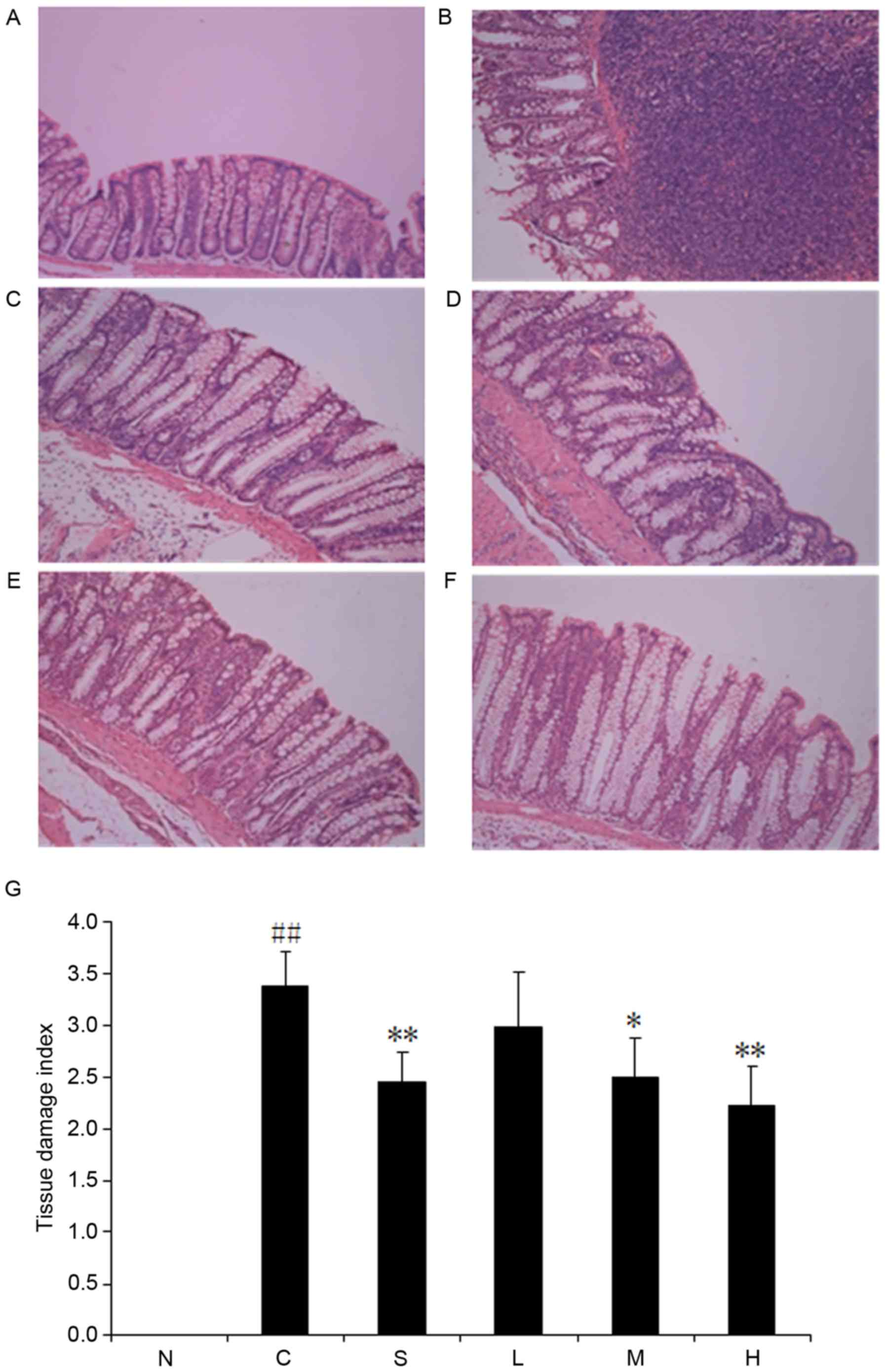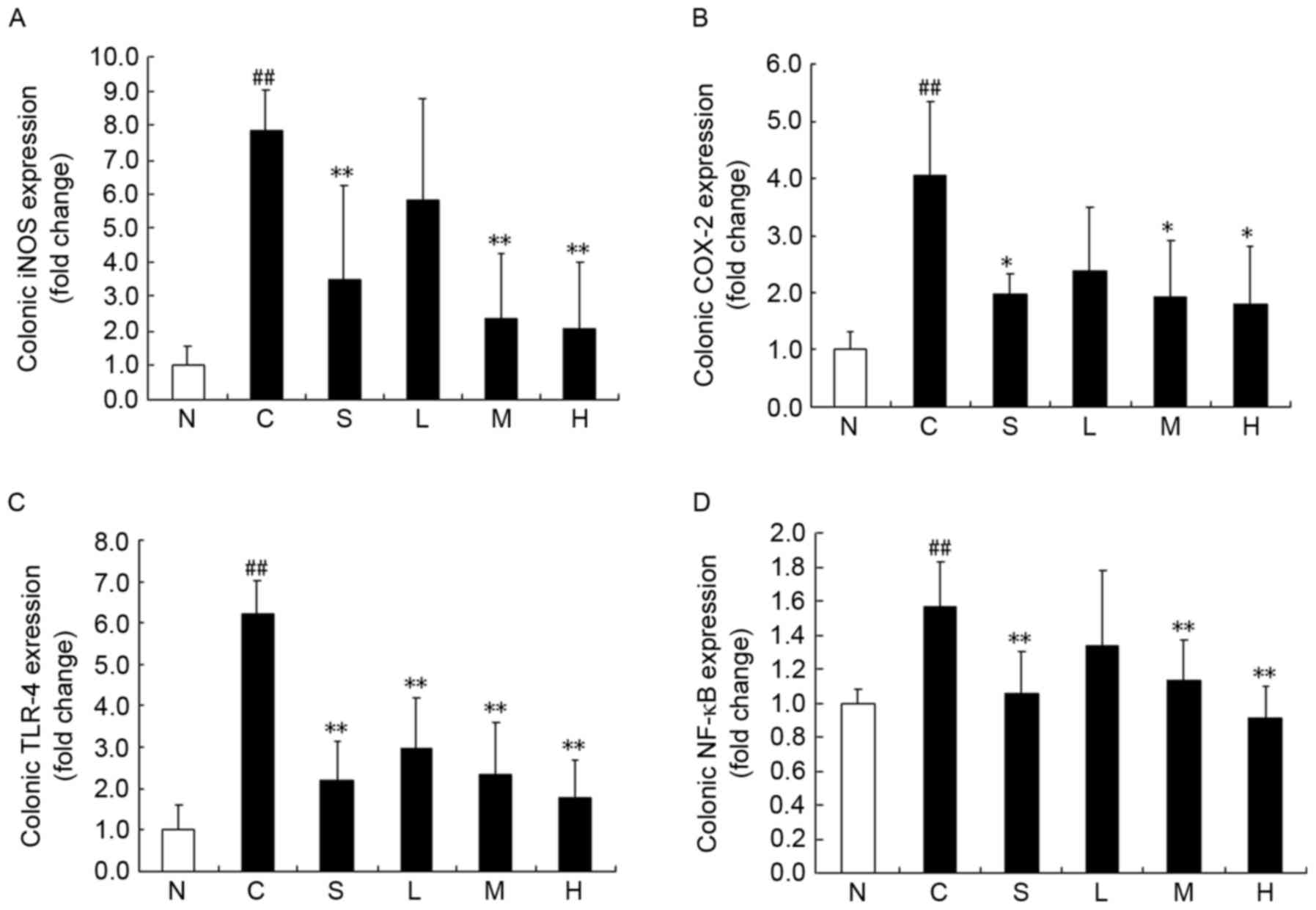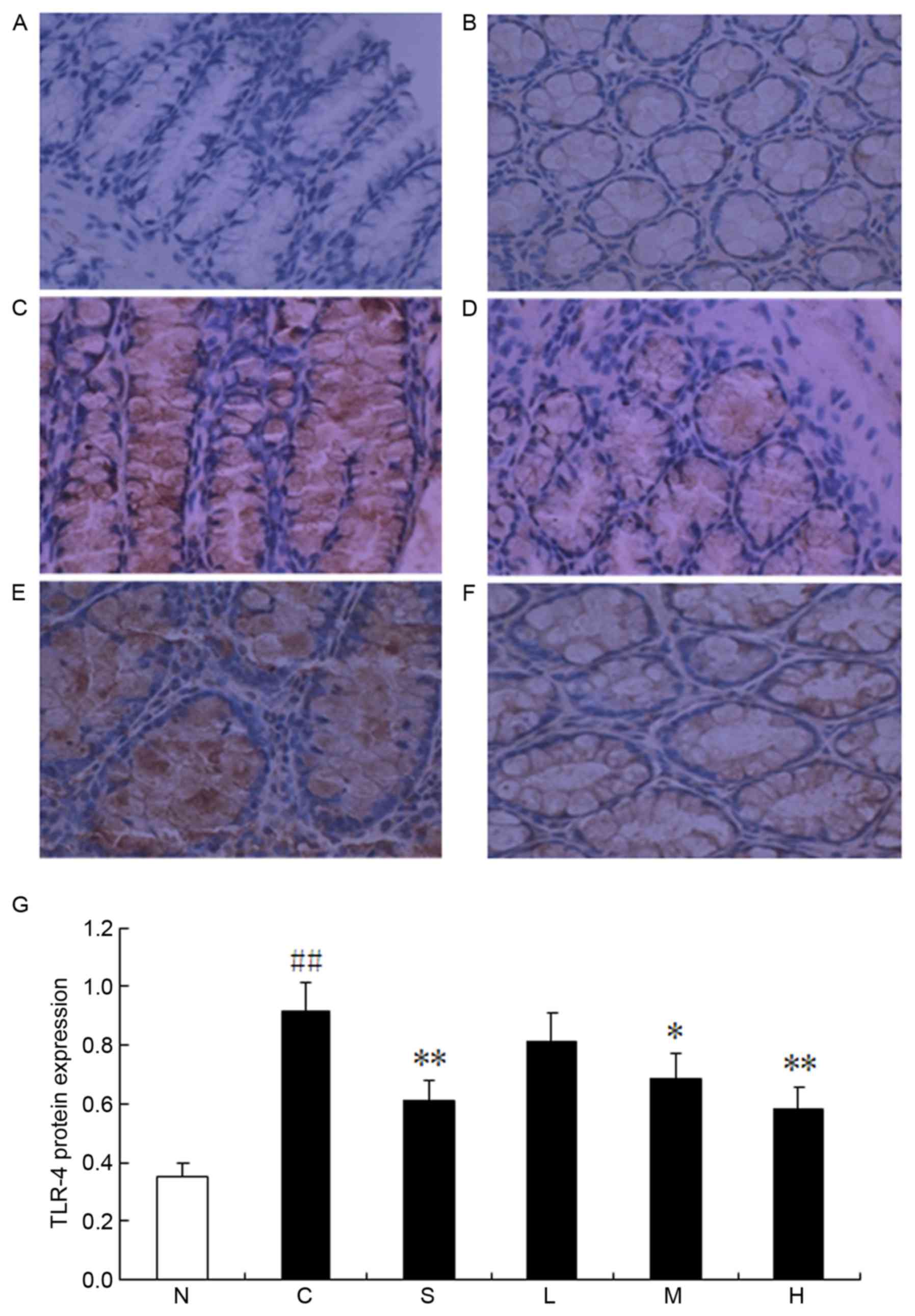|
1
|
Algieri F, Zorrilla P, Rodriguez-Nogales
A, Garrido-Mesa N, Bañuelos O, González-Tejero MR, Casares-Porcel
M, Molero-Mesa J, Zarzuelo A, Utrilla MP, et al: Intestinal
anti-inflammatory activity of hydroalcoholic extracts of Phlomis
purpurea L. and Phlomis lychnitis L. in the
trinitrobenzenesulphonic acid model of rat colitis. J
Ethnopharmacol. 146:750–759. 2013. View Article : Google Scholar : PubMed/NCBI
|
|
2
|
Guo BJ, Bian ZX, Qiu HC, Wang YT and Wang
Y: Biological and clinical implications of herbal medicine and
natural products for the treatment of inflammatory bowel disease.
Ann N Y Acad Sci. 1401:37–48. 2017. View Article : Google Scholar : PubMed/NCBI
|
|
3
|
Bernaskova M, Kretschmer N, Schuehly W,
Huefner A, Weis R and Bauer R: Synthesis of tetrahydrohonokiol
derivates and their evaluation for cytotoxic activity against
CCRF-CEM leukemia, U251 glioblastoma and HCT-116 colon cancer
cells. Molecules. 19:1223–1237. 2014. View Article : Google Scholar : PubMed/NCBI
|
|
4
|
Tsai YC, Cheng PY, Kung CW, Peng YJ, Ke
TH, Wang JJ and Yen MH: Beneficial effects of magnolol in a rodent
model of endotoxin shock. Eur J Pharmacol. 641:67–73. 2010.
View Article : Google Scholar : PubMed/NCBI
|
|
5
|
Chuang DY, Chan MH, Zong Y, Sheng W, He Y,
Jiang JH, Simonyi A, Gu Z, Fritsche KL, Cui J, et al: Magnolia
polyphenols attenuate oxidative and inflammatory responses in
neurons and microglial cells. J Neuroinflammation. 10:152013.
View Article : Google Scholar : PubMed/NCBI
|
|
6
|
Park J, Lee J, Jung E, Park Y, Kim K, Park
B, Jung K, Park E, Kim J and Park D: In vitro antibacterial and
anti-inflammatory effects of honokiol and magnolol against
Propionibacterium sp. Eur J Pharmacol. 496:189–195. 2004.
View Article : Google Scholar : PubMed/NCBI
|
|
7
|
Zhang M, Long Y, Sun Y, Wang Y, Li Q, Wu
H, Guo Z, Li Y, Niu Y, Li C, et al: Evidence for the complementary
and synergistic effects of the three-alkaloid combination regimen
containing berberine, hypaconitine and skimmianine on the
ulcerative colitis rats induced by trinitrobenzene-sulfonic acid.
Eur J Pharmacol. 651:187–196. 2011. View Article : Google Scholar : PubMed/NCBI
|
|
8
|
Kang YJ, Park HJ, Chung HJ, Min HY, Park
EJ, Lee MA, Shin Y and Lee SK: Wnt/β-catenin signaling mediates the
antitumor activity of magnolol in colorectal cancer cells. Mol
Pharmacol. 82:168–177. 2012. View Article : Google Scholar : PubMed/NCBI
|
|
9
|
Witaicenis A, Luchini AC, Hiruma-Lima CA,
Felisbino SL, Garrido-Mesa N, Utrilla P, Gálvez J and Di Stasi LC:
Suppression of TNBS-induced colitis in rats by 4-methylesculetin, a
natural coumarin: Comparison with prednisolone and sulphasalazine.
Chem Biol Interact. 195:76–85. 2012. View Article : Google Scholar : PubMed/NCBI
|
|
10
|
Gonçalves CC, Hernandes L, Bersani-Amado
CA, Franco SL, Silva JF and Natali MR: Use of propolis
hydroalcoholic extract to treat colitis experimentally induced in
rats by 2,4,6-trinitrobenzenesulfonic acid. Evid Based Complement
Alternat Med. 2013:8539762013. View Article : Google Scholar : PubMed/NCBI
|
|
11
|
Chen YH, Lin FY, Liu PL, Huang YT, Chiu
JH, Chang YC, Man KM, Hong CY, Ho YY and Lai MT: Antioxidative and
hepatoprotective effects of magnolol on acetaminophen-induced liver
damage in rats. Arch Pharm Res. 32:221–228. 2009. View Article : Google Scholar : PubMed/NCBI
|
|
12
|
Yang TC, Zhang SW, Sun LN, Wang H and Ren
AM: Magnolol attenuates sepsis-induced gastrointestinal dysmotility
in rats by modulating inflammatory mediators. World J
Gastroenterol. 14:7353–7360. 2008. View Article : Google Scholar : PubMed/NCBI
|
|
13
|
Morris GP, Beck PL, Herridge MS, Depew WT,
Szewczuk MR and Wallace JL: Hapten-induced model of chronic
inflammation and ulceration in the rat colon. Gastroenterology.
96:795–803. 1989. View Article : Google Scholar : PubMed/NCBI
|
|
14
|
Tsune I, Ikejima K, Hirose M, Yoshikawa M,
Enomoto N, Takei Y and Sato N: Dietary glycine prevents
chemical-induced experimental colitis in the rat. Gastroenterology.
125:775–785. 2003. View Article : Google Scholar : PubMed/NCBI
|
|
15
|
Livak KJ and Schmittgen TD: Analysis of
relative gene expression data using real-time quantitative PCR and
the 2(-Delta Delta C(T)) method. Methods. 25:402–408. 2001.
View Article : Google Scholar : PubMed/NCBI
|
|
16
|
Liu X and Wang J: Anti-inflammatory
effects of iridoid glycosides fraction of Folium syringae leaves on
TNBS-induced colitis in rats. J Ethnopharmacol. 133:780–787. 2011.
View Article : Google Scholar : PubMed/NCBI
|
|
17
|
Peran L, Camuesco D, Comalada M, Bailon E,
Henriksson A, Xaus J, Zarzuelo A and Galvez J: A comparative study
of the preventative effects exerted by three probiotics,
Bifidobacterium lactis, Lactobacillus casei and Lactobacillus
acidophilus, in the TNBS model of rat colitis. J Appl Microbiol.
103:836–844. 2007. View Article : Google Scholar : PubMed/NCBI
|
|
18
|
Oz HS, Zhong J and de Villiers WJ:
Osteopontin ablation attenuates progression of colitis in TNBS
model. Dig Dis Sci. 57:1554–1561. 2012. View Article : Google Scholar : PubMed/NCBI
|
|
19
|
Fritsch Fredin M, Elgbratt K, Svensson D,
Jansson L, Melgar S and Hultgren Hörnquist E: Dextran sulfate
sodium-induced colitis generates a transient thymic
involution-impact on thymocyte subsets. Scand J Immunol.
65:421–429. 2007. View Article : Google Scholar : PubMed/NCBI
|
|
20
|
Xing JF, Sun JN, Sun JY, You CY, Dong K,
Lv J and Dong YL: Protective effects of
3,4-oxo-isopropylidene-shikimic acid on experimental colitis
induced by trinitrobenzenesulfonic acid in rats. Dig Dis Sci.
57:2045–2054. 2012. View Article : Google Scholar : PubMed/NCBI
|
|
21
|
Conner EM, Brand SJ, Davis JM, Kang DY and
Grisham MB: Role of reactive metabolites of oxygen and nitrogen in
inflammatory bowel disease: Toxins, mediators, and modulators of
gene expression. Inflamm Bowel Dis. 2:133–147. 1996. View Article : Google Scholar : PubMed/NCBI
|
|
22
|
Szalai Z, Szász A, Nagy I, Puskás LG,
Kupai K, Király A, Berkó AM, Pósa A, Strifler G, Baráth Z, et al:
Anti-inflammatory effect of recreational exercise in TNBS-induced
colitis in rats: Role of NOS/HO/MPO system. Oxid Med Cell Longev.
2014:9259812014. View Article : Google Scholar : PubMed/NCBI
|
|
23
|
Sun P, Zhou K, Wang S, Li P, Chen S, Lin
G, Zhao Y and Wang T: Involvement of MAPK/NF-κB signaling in the
activation of the cholinergic anti-inflammatory pathway in
experimental colitis by chronic vagus nerve stimulation. PLoS One.
8:e694242013. View Article : Google Scholar : PubMed/NCBI
|
|
24
|
Lai CS, Lee JH, Ho CT, Liu CB, Wang JM,
Wang YJ and Pan MH: Rosmanol potently inhibits
lipopolysaccharide-induced iNOS and COX-2 expression through
downregulating MAPK, NF-kappaB, STAT3 and C/EBP signaling pathways.
J Agric Food Chem. 57:10990–10998. 2009. View Article : Google Scholar : PubMed/NCBI
|
|
25
|
Du L, Tang H, Ma Z, Xu J, Gao W, Chen J,
Gan W, Zhang Z, Yu X, Zhou X and Hu X: The protective effect of the
recombinant 53-kDa protein of Trichinella spiralis on experimental
colitis in mice. Dig Dis Sci. 56:2810–2817. 2011. View Article : Google Scholar : PubMed/NCBI
|
|
26
|
Xiong J, Lin YH, Bi LH, Wang JD, Bai Y and
Liu SD: Effects of interleukin-4 or interleukin-10 gene therapy on
trinitrobenzenesulfonic acid-induced murine colitis. BMC
gastroenterol. 13:1652013. View Article : Google Scholar : PubMed/NCBI
|
|
27
|
Caprioli F, Pallone F and Monteleone G:
Th17 immune response in IBD: A new pathogenic mechanism. J Crohns
Colitis. 2:291–295. 2008. View Article : Google Scholar : PubMed/NCBI
|
|
28
|
Joh EH, Lee IA, Han SJ, Chae S and Kim DH:
Lancemaside A ameliorates colitis by inhibiting NF-kappaB
activation in TNBS-induced colitis mice. Int J Colorectal Dis.
25:545–551. 2010. View Article : Google Scholar : PubMed/NCBI
|
|
29
|
Himmel ME, Hardenberg G, Piccirillo CA,
Steiner TS and Levings MK: The role of T-regulatory cells and
Toll-like receptors in the pathogenesis of human inflammatory bowel
disease. Immunology. 125:145–153. 2008. View Article : Google Scholar : PubMed/NCBI
|
|
30
|
Pasparakis M: IKK/NF-kappaB signaling in
intestinal epithelial cells controls immune homeostasis in the gut.
Mucosal Immunol. 1 Suppl 1:S54–S57. 2008. View Article : Google Scholar : PubMed/NCBI
|
|
31
|
Seo JU, Kim MH, Kim HM and Jeong HJ:
Anticancer potential of magnolol for lung cancer treatment. Arch
Pharm Res. 34:625–633. 2011. View Article : Google Scholar : PubMed/NCBI
|
















